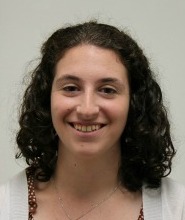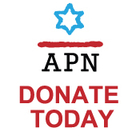Dear Friend,
At the darkest time of winter, Jews celebrate Chanukah, adding one candle each night to increase the light. Many of us place our menorah in a window in fulfillment of the mitzvah to “publicize the miracle” of the small cruse of oil that contained only enough for one day but lasted for eight.
This particular winter is an especially dark time for those of us who have been working for decades to support a two-state solution to the Israeli-Palestinian conflict. There’s no denying that the peace process has stalled. The parties are not talking to one another. The Occupation continues unabated. We read of growing violence. Some people have even begun to question the possibility of a two-state solution.
In this dark time, where do we find the light? Once all eight Chanukah candles have burned down, how do we avoid plunging into hopelessness and despair?
At APN, we increase the light by keeping policy makers and the American public well-informed about legislation that affects Israel and her neighbors. We shine a spotlight on what is really happening on the ground in the Settlements and in East Jerusalem and in the upcoming elections. We help support Shalom Achschav, Peace Now in Israel, the country’s leading pro-peace organization that was founded in 1978 by 348 Israeli senior reserve army officers, and is still going strong.
This year, I want to publicize another kind of miracle, the miracle of passionate advocates and fearless activists who are committed to a just, fair, and peaceful resolution to the Israeli-Palestinian conflict, an agreement that recognizes the rights and dignity of both peoples. One of these is a young activist named Hannah Ehlers, an APN intern, whose love for Israel fuels her belief that the country must live up to its highest ideals. I urge you to read her article below and make a tax-deductible contribution to APN so that we may continue to increase the light and publicize the miracle of young people who have not lost hope.
Sincerely,
Letty Cottin Pogrebin
Board member, Americans for Peace Now
Conflicted in the Diaspora:
Reflections of a Young American Jew
by APN's summer intern Hannah Ehlers

Early in my Jewish education, I was taught that, as Jews and as human beings living in an imperfect world, we are obligated to stand up and speak out in the face of injustice. However small or large the perceived wrong, and despite our shaking legs and cracking voices or a powerful and vocal opposition trying to silence us, it is our duty as Jews to confront injustice. As a Reform Jew, I was taught to question and to think critically about the world, my faith, and my personal views and perceptions. And yet, when it came to Israel, there existed in the Jewish community a sort of unwritten rule, an unspoken promise not to question Israel or its policies. I would later discover that this attitude reflected the larger American and international Jewish community and many communal institutions. Although my Hebrew school classmates and I were encouraged to struggle and wrestle with God and Jewish theology, and to have a complicated relationship with American society, we subconsciously subscribed to the attitude, based on fear, that any criticism of Israel was a threat to the Jewish people.
Meanwhile, in his inspiring, progressive sermons, our Rabbi spoke out against the Iraq war, the unequal treatment of woman in the workplace, the Bush administration’s use of waterboarding, and many other issues of social and political import. We were encouraged to speak critically, when appropriate, of the U.S. Government and its policies, and of inequities in American society. As a congregation, we were called to action to ensure that the country we know and love upholds its constitutional ideals and cherished values. We were encouraged to believe that dissent is, in the words of historian Howard Zinn, “the highest form of patriotism.”
But criticism of Israel and its government, of Israeli policies and society, was strongly discouraged. Israeli policies remained untouched, its government’s actions always deemed justified. As Jews, we were expected to give Israel our undying support by our words and our wallets. I do not believe that the Rabbi or the synagogue’s leaders were purposefully manipulative or ill-intentioned, but their overly sensitive defense of Israel did not prepare me for some of the conversations and new perspectives that I have since encountered in my young adult life. There were some Israeli policies and actions that I found I could simply not defend, and I felt betrayed, for it seemed that I had been provided with only three-fourths of the truth.
As a committed Jew and lover of Israel, I can no longer unconditionally defend the Israeli occupation and the unjustifiable misery and humiliation it daily imposes on the Palestinians. I can no longer defend the ever-expanding settlements and detrimental damage they do to the two-state solution—the only viable, just solution to the conflict that ensures Israel’s long-term security. I can no longer defend the slow, painful erosion of Israel’s democratic and Jewish character by right-wing extremists in the Israeli government. And I can no longer remain silent as the country I love, my Jewish homeland, acts in self-destructive ways.
This summer I have been privileged to intern with the brilliant, dedicated people at Americans for Peace Now (APN), who refuse to be silent in their love for Israel. They understand that true support for Israel does not mean uncritical devotion to the nation’s every policy and action. APN is an inspiring organization with a powerful message of peace and reconciliation. If not for organizations like APN, many Jewish peers and I would be less involved with Israel and with the Jewish community. For those of us motivated by a love of Israel and hope for a better future, and who wish to apply the progressive Jewish values that our religious education has instilled in us, APN offers a viable and safe home.
In the end, I believe it is only through the voices of peace, of love, of understanding and empathy, and of justice – the voices of people and organizations like APN – that can achieve a lasting peace for Israelis and Palestinians, and that will help retain the Jewish and democratic character of Israel. I am grateful and honored to have had the opportunity to intern at APN. The valuable skills and knowledge I have acquired at APN have reinforced my desire to pursue Jewish Studies, to dedicate my life to the Jewish values I hold dear, and to live a life of Tikkun Olam.
**Howard Zinn quote source: 2002 Interview of Howard Zinn by Sharon Basco of TomPaine.com, “Dissent in Pursuit of Equality, Life, Liberty and Happiness”.
